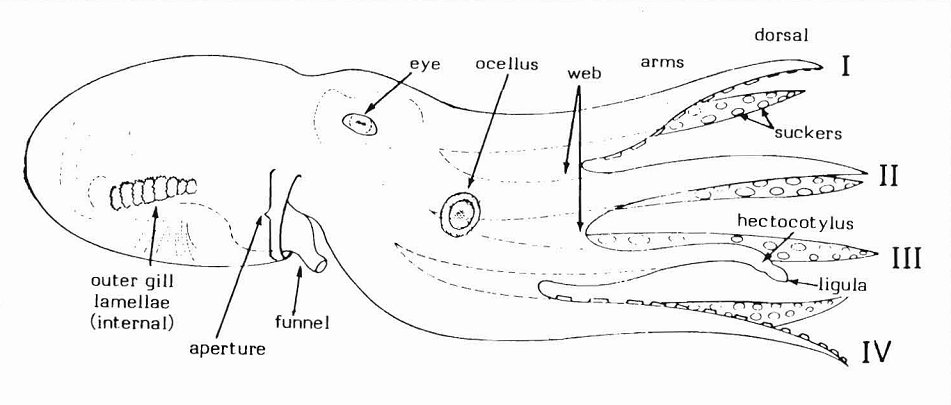|
Gelatinous Blanket Octopus
''Tremoctopus gelatus'', the gelatinous blanket octopus, is a species of octopod formally described by Thomas in 1977. The length of ''T. gelatus'' is unknown. The gelatinous blanket octopus lives in pelagic subtropical waters of the Atlantic Ocean The Atlantic Ocean is the second-largest of the world's five oceans, with an area of about . It covers approximately 20% of Earth#Surface, Earth's surface and about 29% of its water surface area. It is known to separate the "Old World" of Afr .... References {{Taxonbar, from=Q658716 Octopuses Molluscs described in 1977 Molluscs of the Atlantic Ocean ... [...More Info...] [...Related Items...] OR: [Wikipedia] [Google] [Baidu] |
Octopus
An octopus ( : octopuses or octopodes, see below for variants) is a soft-bodied, eight- limbed mollusc of the order Octopoda (, ). The order consists of some 300 species and is grouped within the class Cephalopoda with squids, cuttlefish, and nautiloids. Like other cephalopods, an octopus is bilaterally symmetric with two eyes and a beaked mouth at the center point of the eight limbs. The soft body can radically alter its shape, enabling octopuses to squeeze through small gaps. They trail their eight appendages behind them as they swim. The siphon is used both for respiration and for locomotion, by expelling a jet of water. Octopuses have a complex nervous system and excellent sight, and are among the most intelligent and behaviourally diverse of all invertebrates. Octopuses inhabit various regions of the ocean, including coral reefs, pelagic waters, and the seabed; some live in the intertidal zone and others at abyssal depths. Most species grow quickly, mature earl ... [...More Info...] [...Related Items...] OR: [Wikipedia] [Google] [Baidu] |
Subtropics
The subtropical zones or subtropics are geographical and climate zones to the north and south of the tropics. Geographically part of the temperate zones of both hemispheres, they cover the middle latitudes from to approximately 35° north and south. The horse latitudes lie within this range. Subtropical climates are often characterized by hot summers and mild winters with infrequent frost. Most subtropical climates fall into two basic types: humid subtropical ( Koppen climate Cfa), where rainfall is often concentrated in the warmest months, for example Southeast China and the Southeastern United States, and dry summer or Mediterranean climate ( Koppen climate Csa/Csb), where seasonal rainfall is concentrated in the cooler months, such as the Mediterranean Basin or Southern California. Subtropical climates can also occur at high elevations within the tropics, such as in the southern end of the Mexican Plateau and in Da Lat of the Vietnamese Central Highlands. The ... [...More Info...] [...Related Items...] OR: [Wikipedia] [Google] [Baidu] |
Atlantic Ocean
The Atlantic Ocean is the second-largest of the world's five oceans, with an area of about . It covers approximately 20% of Earth#Surface, Earth's surface and about 29% of its water surface area. It is known to separate the "Old World" of Africa, Europe and Asia from the "New World" of the Americas in the European perception of Earth, the World. The Atlantic Ocean occupies an elongated, S-shaped basin extending longitudinally between Europe and Africa to the east, and North America, North and South America to the west. As one component of the interconnected World Ocean, it is connected in the north to the Arctic Ocean, to the Pacific Ocean in the southwest, the Indian Ocean in the southeast, and the Southern Ocean in the south (other definitions describe the Atlantic as extending southward to Antarctica). The Atlantic Ocean is divided in two parts, by the Equatorial Counter Current, with the North(ern) Atlantic Ocean and the South(ern) Atlantic Ocean split at about 8th paralle ... [...More Info...] [...Related Items...] OR: [Wikipedia] [Google] [Baidu] |
Octopuses
An octopus ( : octopuses or octopodes, see below for variants) is a soft-bodied, eight- limbed mollusc of the order Octopoda (, ). The order consists of some 300 species and is grouped within the class Cephalopoda with squids, cuttlefish, and nautiloids. Like other cephalopods, an octopus is bilaterally symmetric with two eyes and a beaked mouth at the center point of the eight limbs. The soft body can radically alter its shape, enabling octopuses to squeeze through small gaps. They trail their eight appendages behind them as they swim. The siphon is used both for respiration and for locomotion, by expelling a jet of water. Octopuses have a complex nervous system and excellent sight, and are among the most intelligent and behaviourally diverse of all invertebrates. Octopuses inhabit various regions of the ocean, including coral reefs, pelagic waters, and the seabed; some live in the intertidal zone and others at abyssal depths. Most species grow quickly, mature earl ... [...More Info...] [...Related Items...] OR: [Wikipedia] [Google] [Baidu] |
Molluscs Described In 1977
Mollusca is the second-largest phylum of invertebrate animals after the Arthropoda, the members of which are known as molluscs or mollusks (). Around 85,000 extant species of molluscs are recognized. The number of fossil species is estimated between 60,000 and 100,000 additional species. The proportion of undescribed species is very high. Many taxa remain poorly studied. Molluscs are the largest marine phylum, comprising about 23% of all the named marine organisms. Numerous molluscs also live in freshwater and terrestrial habitats. They are highly diverse, not just in size and anatomical structure, but also in behaviour and habitat. The phylum is typically divided into 7 or 8 taxonomic classes, of which two are entirely extinct. Cephalopod molluscs, such as squid, cuttlefish, and octopuses, are among the most neurologically advanced of all invertebrates—and either the giant squid or the colossal squid is the largest known invertebrate species. The gast ... [...More Info...] [...Related Items...] OR: [Wikipedia] [Google] [Baidu] |



